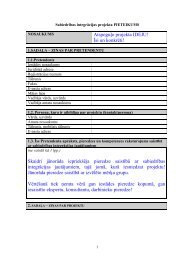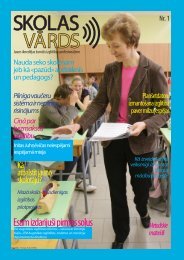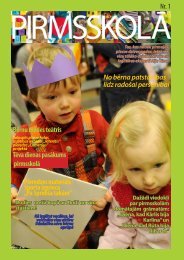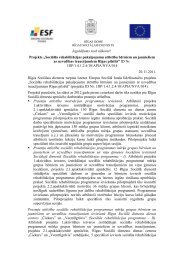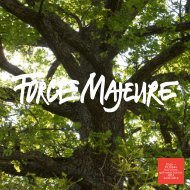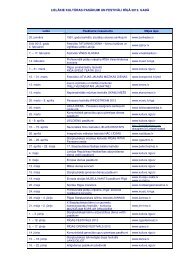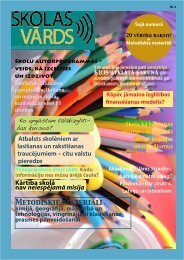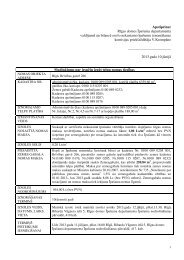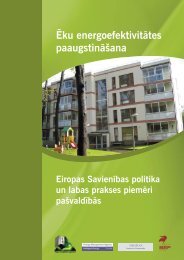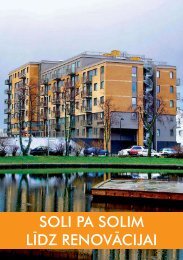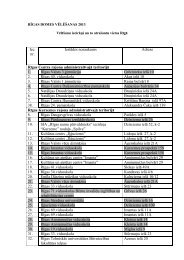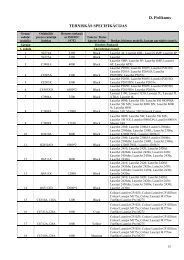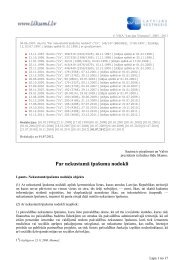Riga - European Capital of Culture 2014 candidate
Riga - European Capital of Culture 2014 candidate
Riga - European Capital of Culture 2014 candidate
- No tags were found...
You also want an ePaper? Increase the reach of your titles
YUMPU automatically turns print PDFs into web optimized ePapers that Google loves.
The theoryexists that atthe base <strong>of</strong>communicationbetween anytwo people is:you for me – mefor you. Thereis no such thingas disinterestedcommunication.That would bethe highestlevel <strong>of</strong>creativity,if we were allable to talkabout clearthings in clearlanguage.”The newest moderntechnologies helpinterest groupsincorporate into acommon culturalprocess and promotethe accessibility <strong>of</strong>the field <strong>of</strong> cultureto each and every,which relates to theexpansion <strong>of</strong> borders.We live in a time that could be described as waking up from the globalisation.Liberalism that stimulated it is going out <strong>of</strong> fashion. Different crises - rise <strong>of</strong> fuelprices, the growing food prices, climatic threats, the looming regional conflicts– are waking us up from the dream (nightmare) <strong>of</strong> globalisation and we feel thateverything must change: economy must become environment-friendly, industrialproduction – science-consuming, food – healthy, lifestyle – sustainable, politicsresponsible and the society – cohesive. The globalised markets will have tocontract and regain a part <strong>of</strong> their rooted-ness and local-ness.We are a fairly diverse society. The new solution,creativity, is in the search for common points <strong>of</strong> contact.Creativity isn’t in ethnic difference, but in the comingtogether and creation <strong>of</strong> a new world.Development is born in the depth <strong>of</strong> the individual, butit also springs from the collective spirit. If one <strong>of</strong> these ismissing, development leaves much to be desired.forms <strong>of</strong> interaction• In recent years the consumption <strong>of</strong> culture in <strong>Riga</strong> has increased.Research indicates that the majority <strong>of</strong> <strong>Riga</strong>’s inhabitants are satisfiedwith the level <strong>of</strong> possibilities available to them to attend culturalevents, but the tendency towards a transitional society that resultedin alienation, disassociation, loss <strong>of</strong> social ties, has completely excludedcultural instruments such as new cooperation forms.• Creativity through the idea <strong>of</strong> border expansion will promotewide cooperation between individuals, city areas, suburbs, generations,towns, regions, countries. <strong>Riga</strong>, with its human capital andinfrastructure, will promote the creation <strong>of</strong> this form <strong>of</strong> cooperation.Cultural events are a self-evident part <strong>of</strong> <strong>Riga</strong>’s programmefor the ECC project, however, the main goal is to trigger a processin which the consumers <strong>of</strong> culture would also be willing also totake an active part. Thus, the main task is to create new forms <strong>of</strong>interaction to help involve new audiences.• Making use <strong>of</strong> the potential <strong>of</strong> creativity, imagination and cooperation,it is possible to create networks around <strong>Riga</strong>, includingindividuals, institutions, businesses, towns and countries insearch for forms <strong>of</strong> cooperation, creating the possibility <strong>of</strong> newcooperation forms through new infrastructure facilities or breathinglife into existing ones.• It is important to achieve a change <strong>of</strong> focus from the consumption<strong>of</strong> culture to participation, from a passive consumerismto a change in attitude towards any kind <strong>of</strong> creativity. This includesa re-evaluation <strong>of</strong> values in society, which means a search for newforms <strong>of</strong> interaction.• The desire for expression is typical to creativity, as well as theneed for appropriate forms <strong>of</strong> expression. It provides further impulseto seek interaction with partners sharing similar interests, in order t<strong>of</strong>ind an audience for one’s skills and their evaluation. Support fornew forms <strong>of</strong> cooperation plays a cruical role in stimulating creativeskills within each and every inhabitant <strong>of</strong> <strong>Riga</strong>, making creativity themost significant force driving <strong>Riga</strong> as the ECC.• Developing forms <strong>of</strong> culture based within the audience, onmutual communication and political intention rather than onmaterial, spatial or artistic media typology, creates a platform forparticipation. The epicentre <strong>of</strong> the meaning <strong>of</strong> a work <strong>of</strong> art orcultural process as such shifts from the object to a new type <strong>of</strong>experience that it provokes. The dialogue between the audienceand the artist acquires the status <strong>of</strong> a work <strong>of</strong> art, participationbecomes the deciding factor in the creation <strong>of</strong> culture. Similarlyto Umberto Eco’s definition <strong>of</strong> the principle <strong>of</strong> an open work <strong>of</strong>art, which states that a work <strong>of</strong> art is only finished when it comesinto contact with the audience, the involvement <strong>of</strong> society in thecultural process reveals a new cultural dimension.• Successful interaction is a vital component for the positivedevelopment <strong>of</strong> a multicultural and civil society. <strong>Culture</strong>, in thissituation, is a tried and tested device in promoting dialogue betweencultures and civil society.• Ethnocentricity creates a symbolically restricted space. Dueto <strong>Riga</strong>’s ethnic specifications, the possibility <strong>of</strong> dialogue betweenvarious ethnic groups exists through border expansion and creativityas a value, thus promoting an exchange <strong>of</strong> ideas, developingsociety’s receptiveness towards different cultural experiences.• Research shows that it is possible to develop a culture <strong>of</strong> philanthropyin Latvia, which would help overcome the tendency towardsmutual isolation between various sections <strong>of</strong> society and provide theopportunity for the majority <strong>of</strong> inhabitants to fulfil their human capital.• To prosper, a city needs ideas and the will <strong>of</strong> individuals, synthesis<strong>of</strong> thoughts and cooperation. New products and servicesare created not only through individual efforts but also as a result<strong>of</strong> cooperation. It is necessary to provide opportunities for enterprising,creative people to try something new together.• The contemporary public space, which serves as a platformfor interaction, is <strong>of</strong>ten identified more as a psychological ratherthan a physical construction <strong>of</strong> space. The public space is alsodefined as a politicised social product, which cannot be separatedfrom conflicting social relations that are created by specificsocieties at specific moments in history.* Focus group comments24 25



